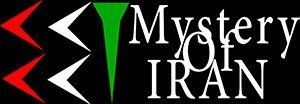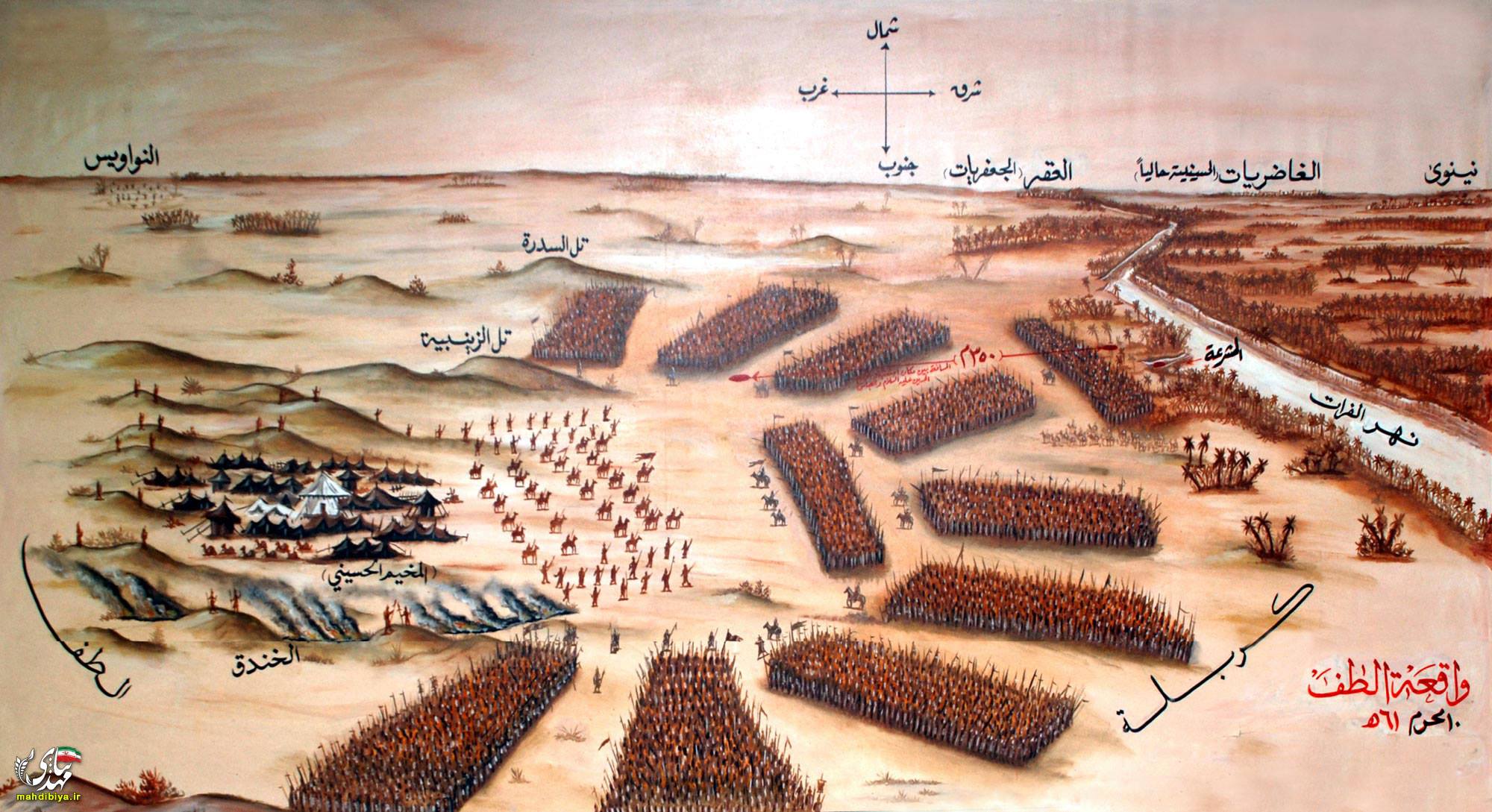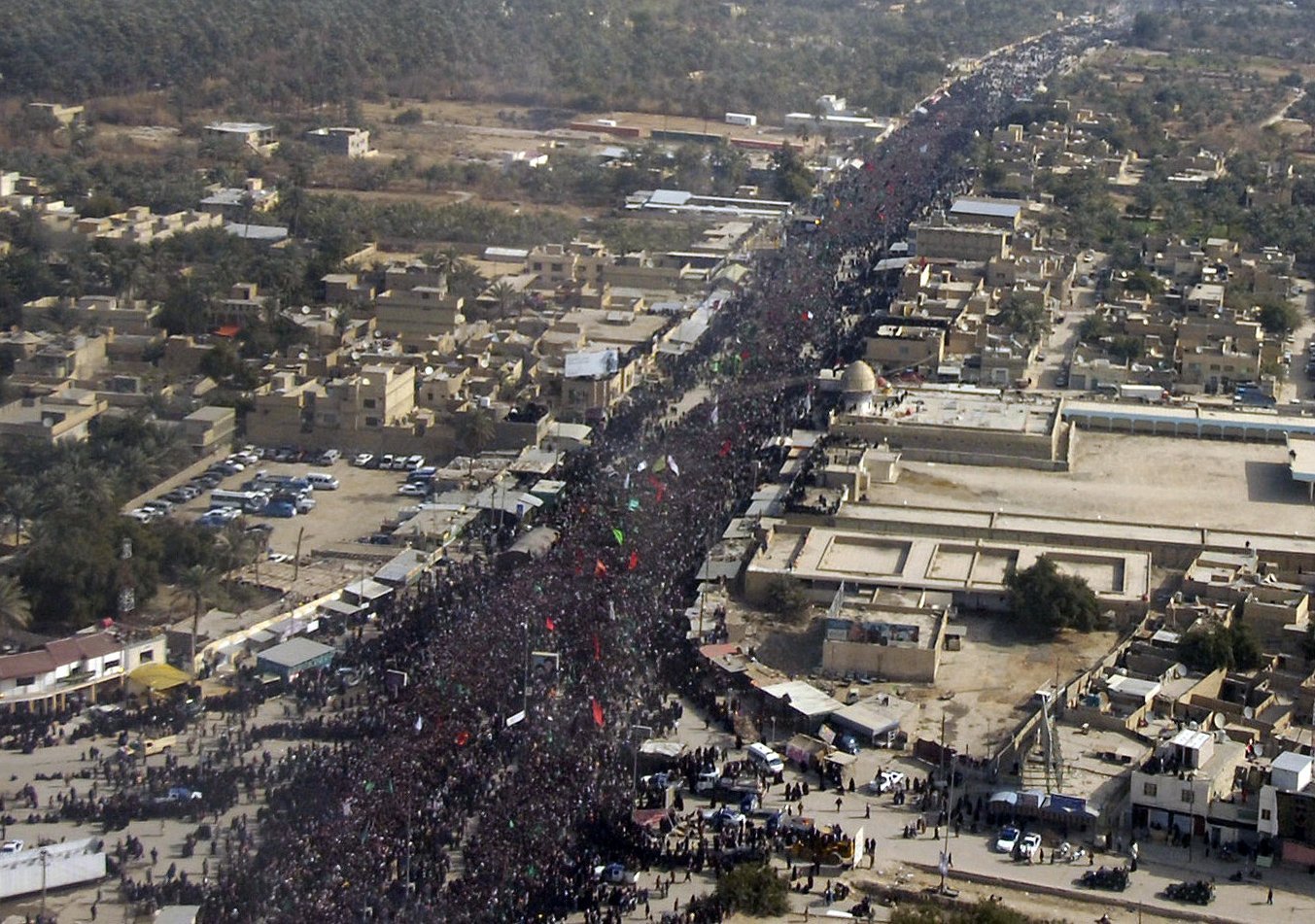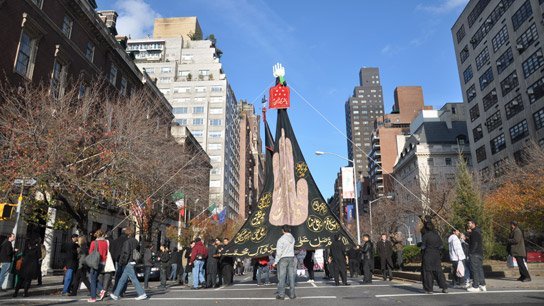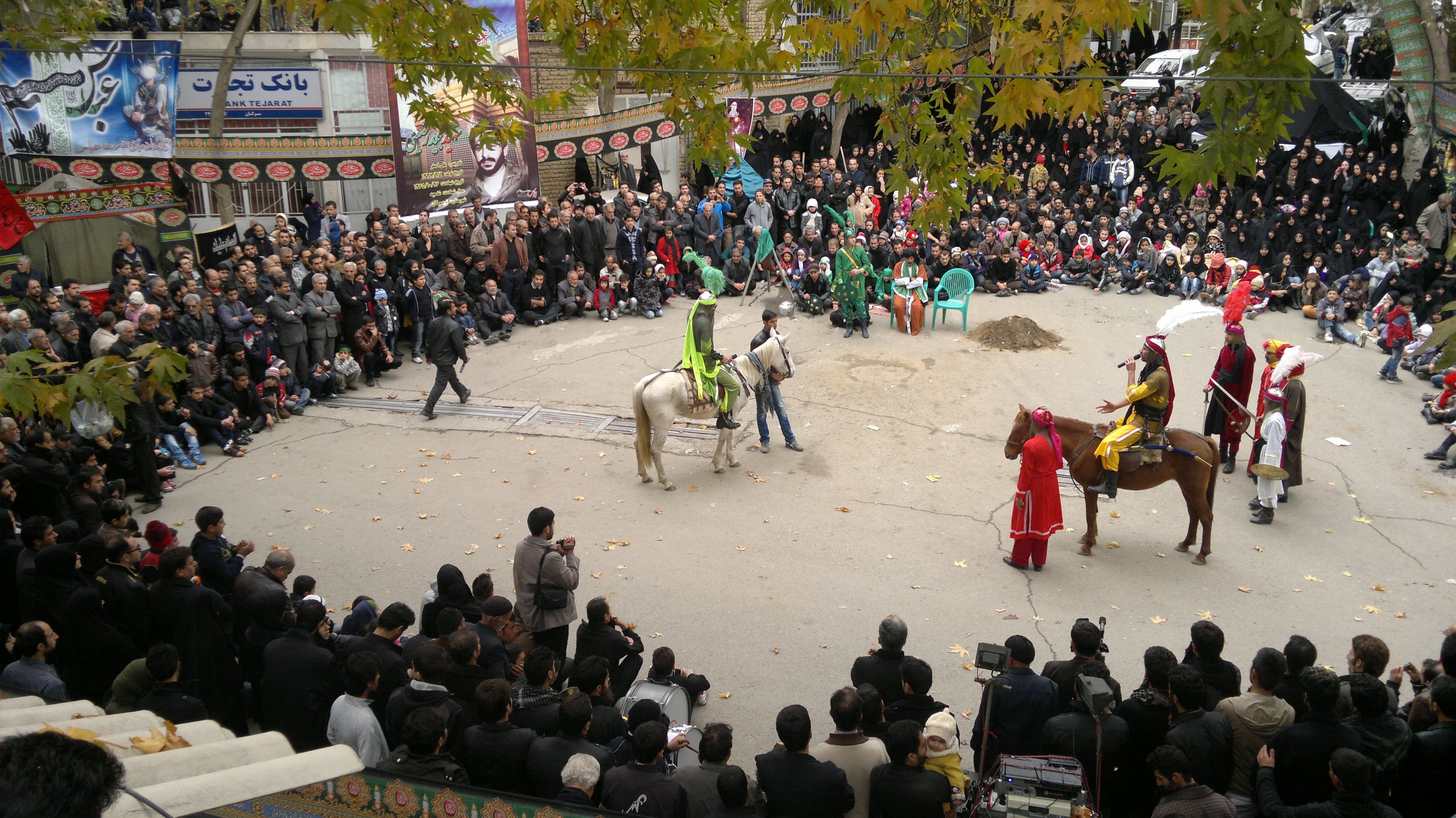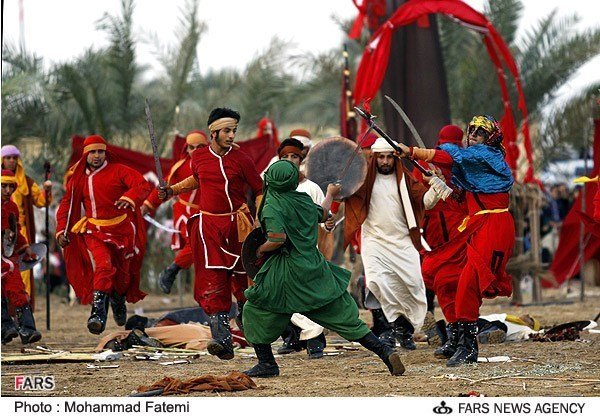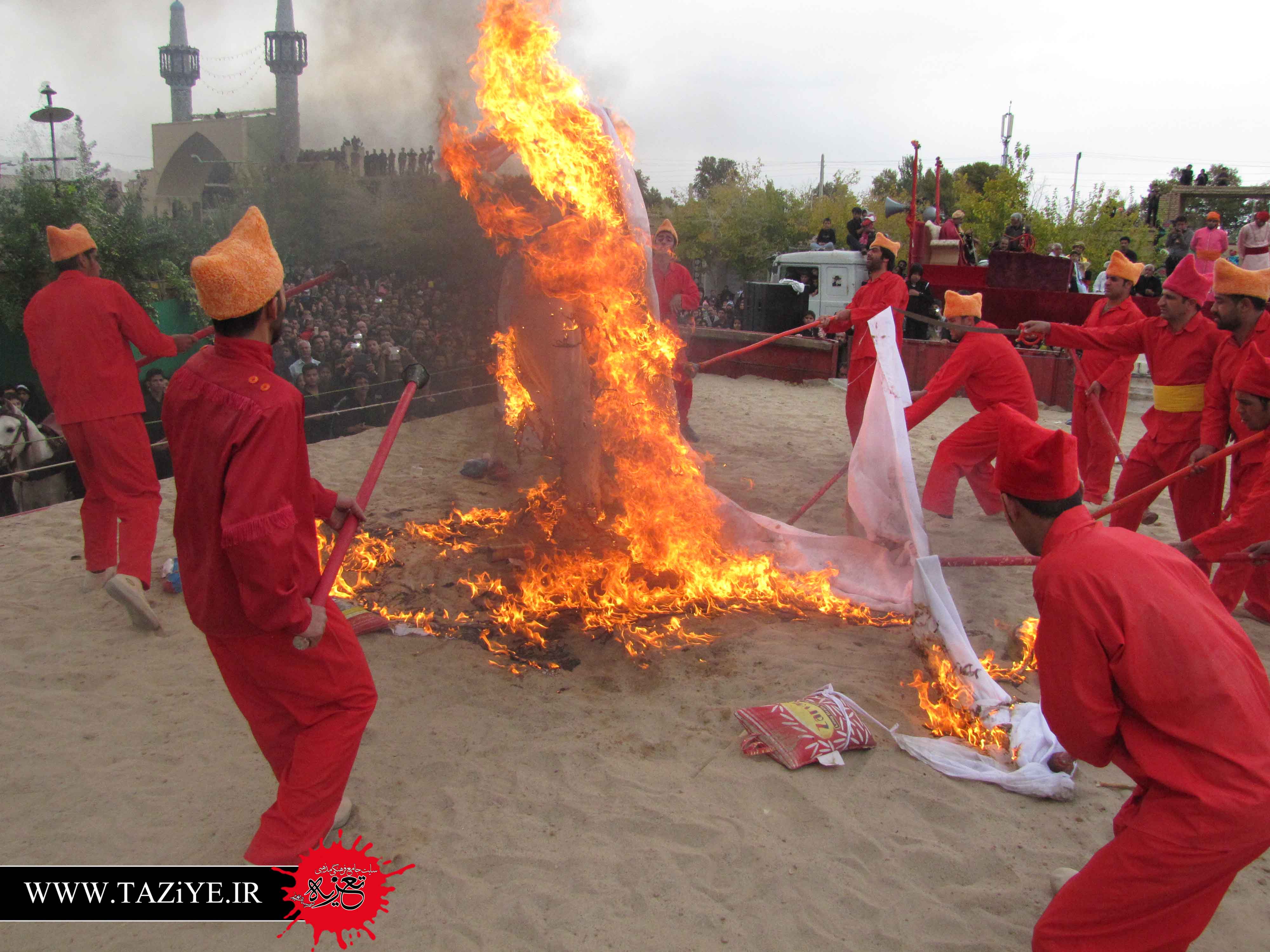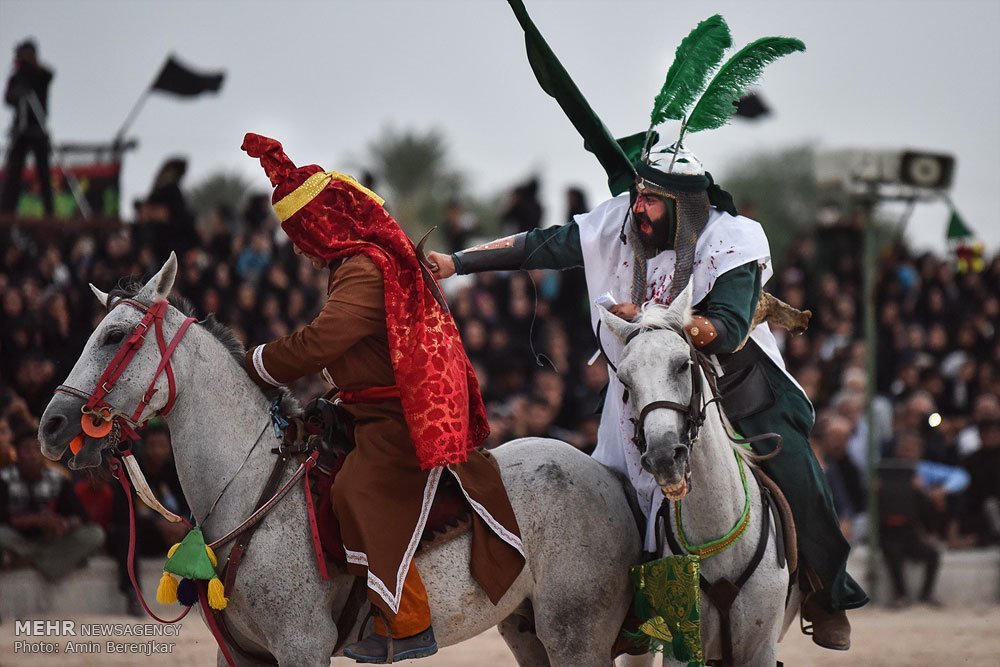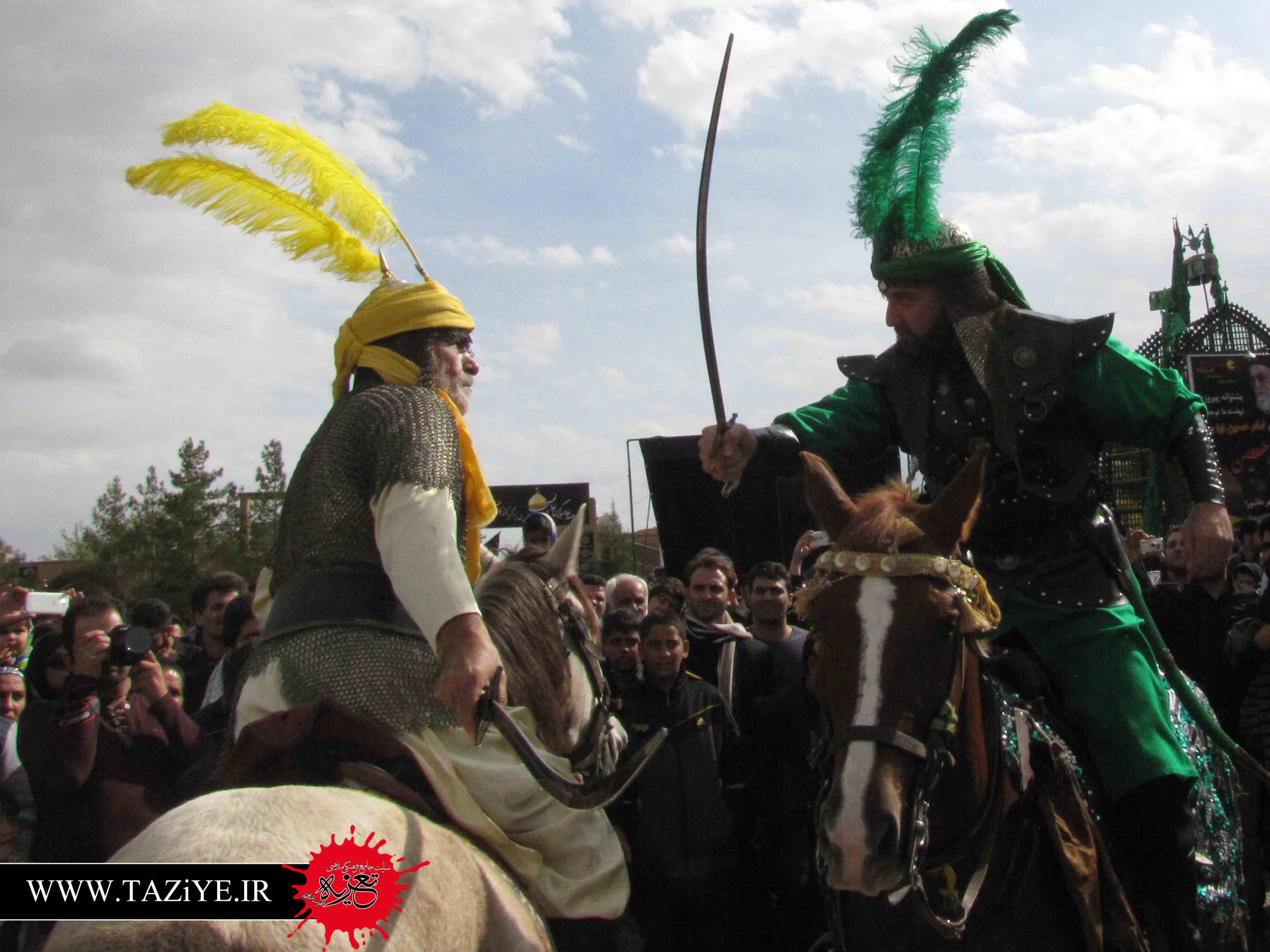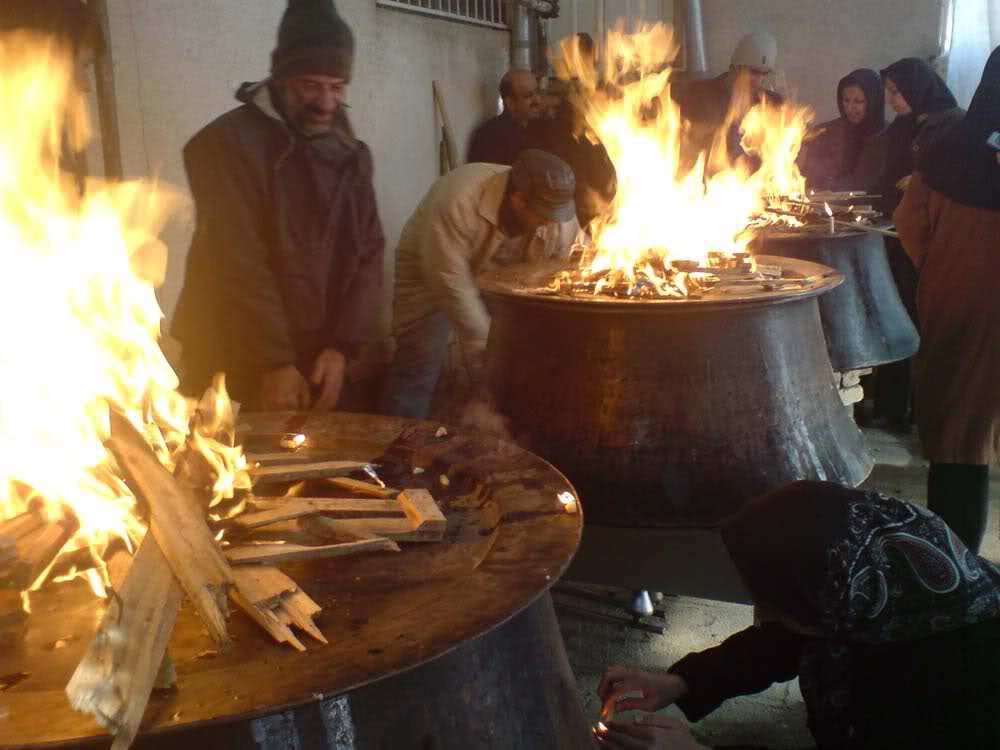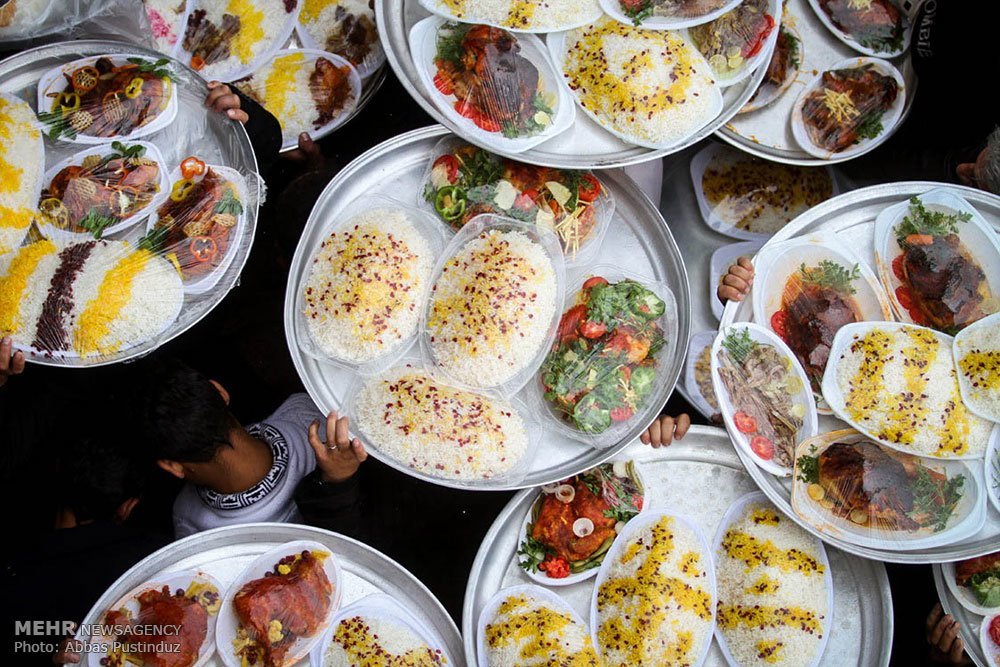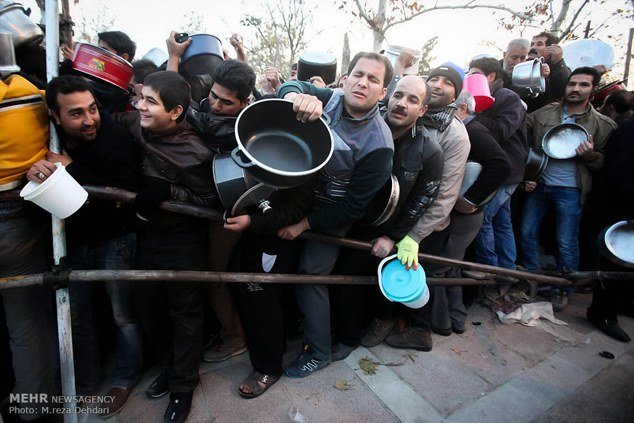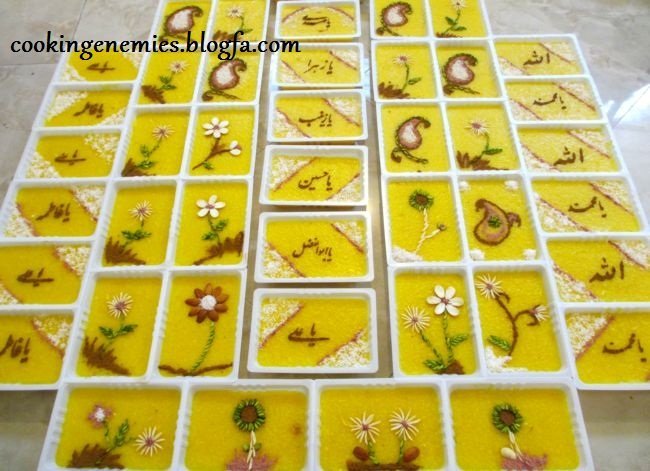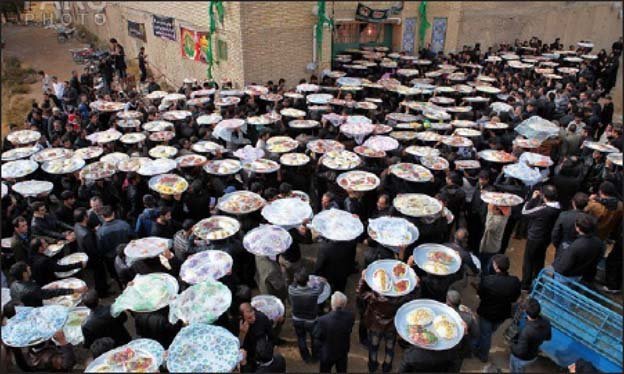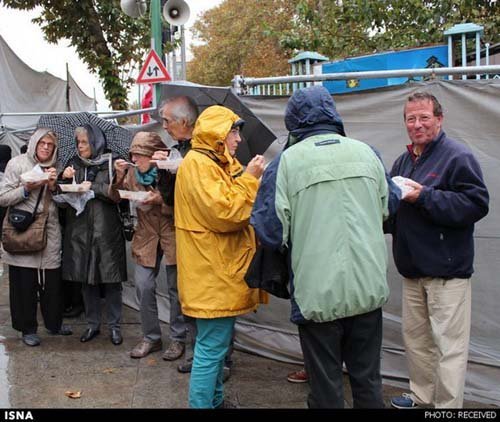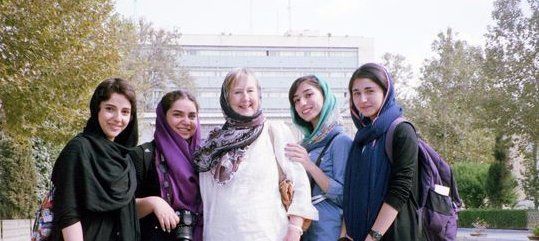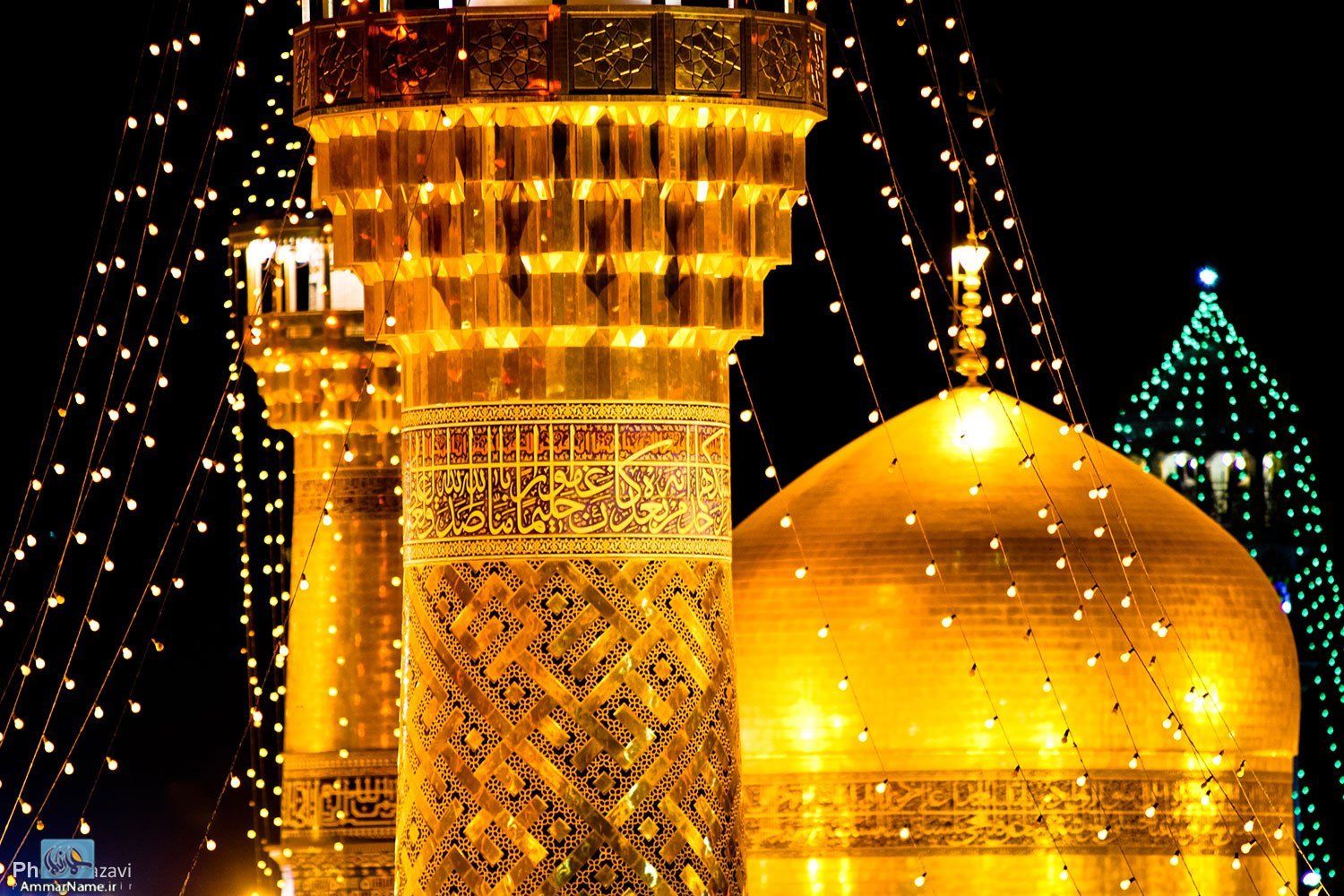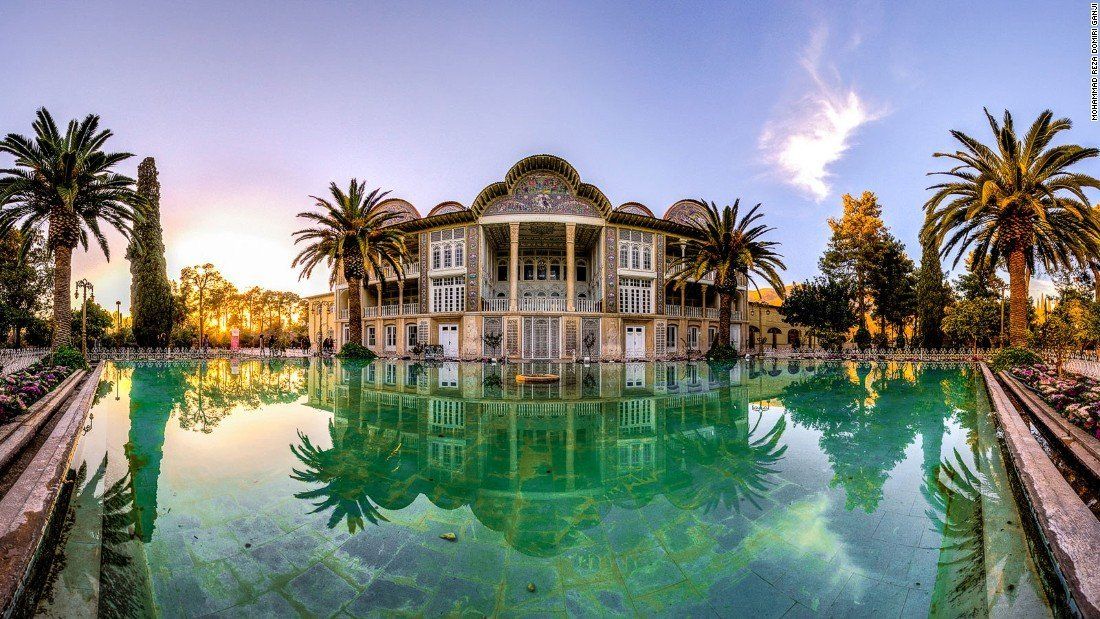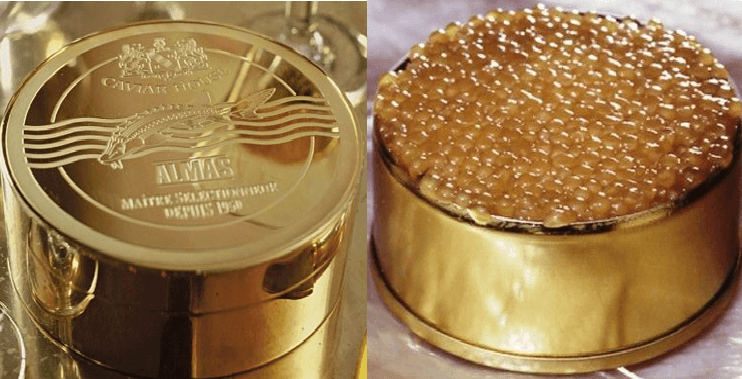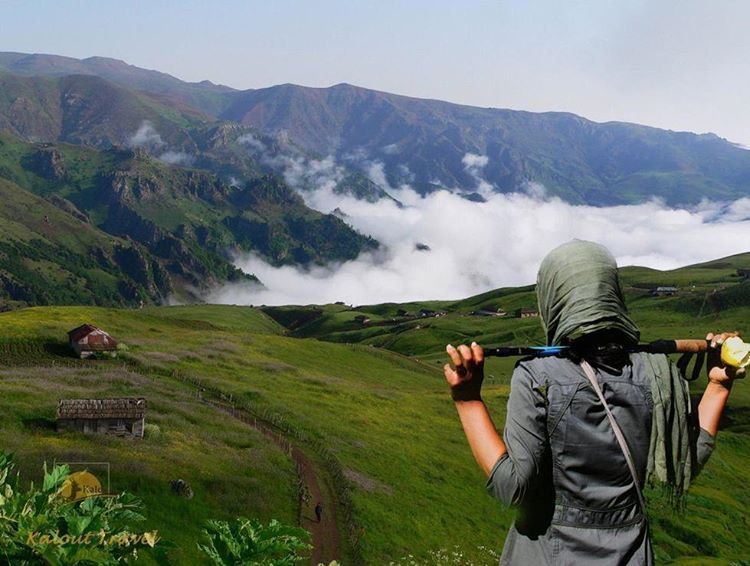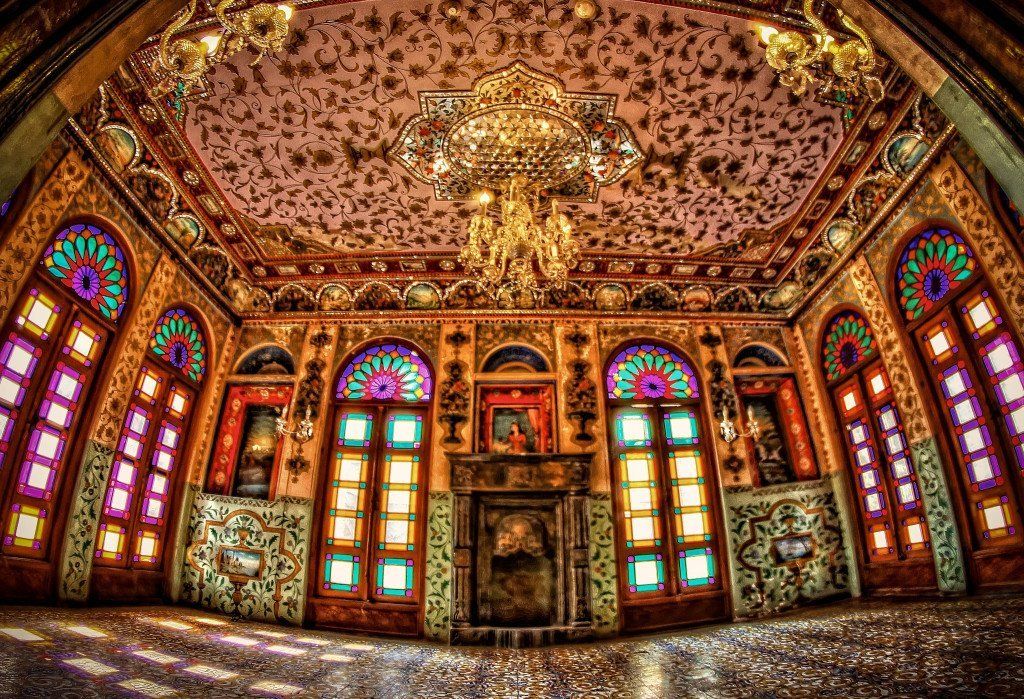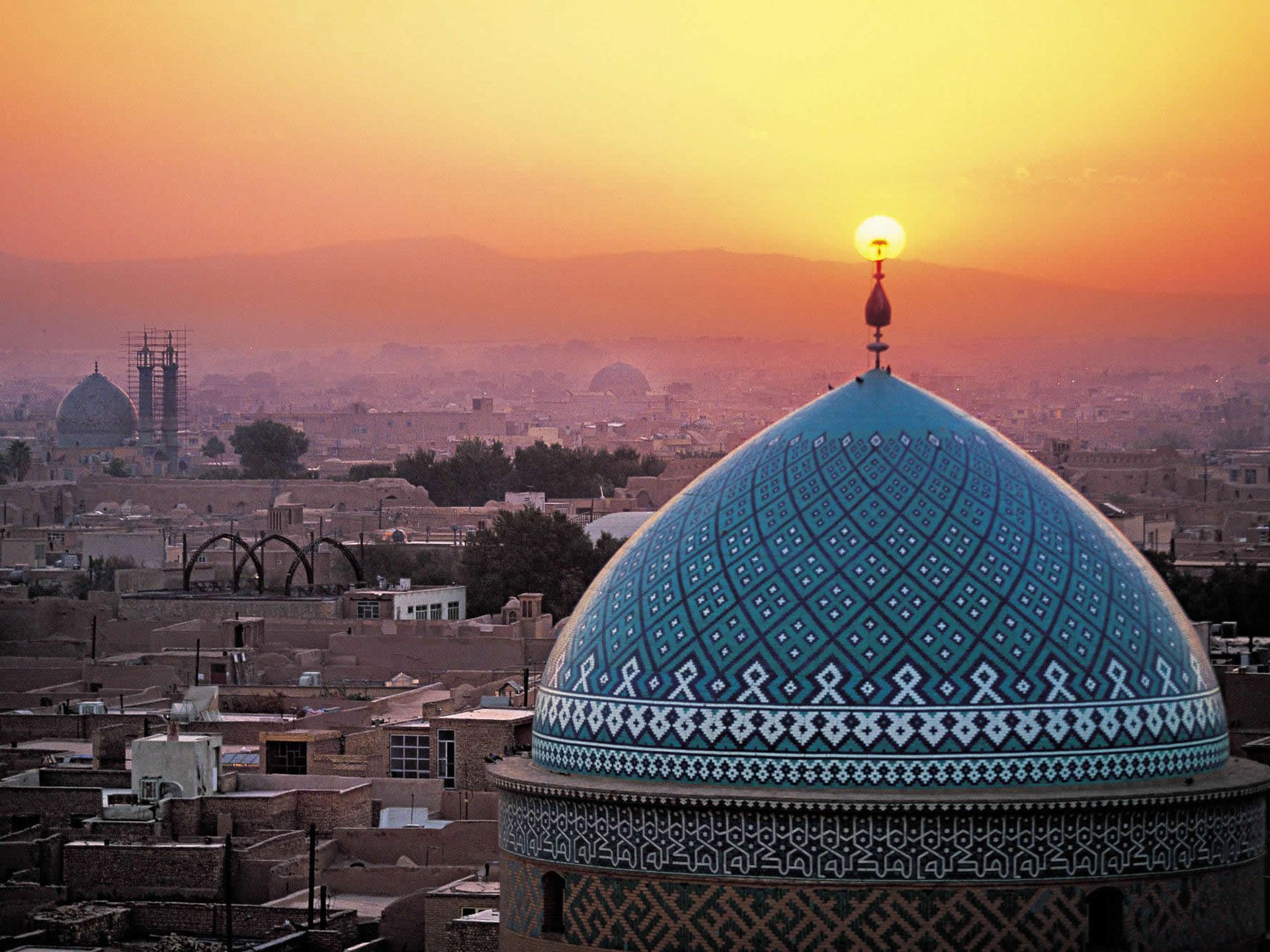Day of Ashura or Ashoora
The Day of Ashura (Arabic: عاشوراء ʻĀshūrā’, colloquially: /ʕa(ː)ˈʃuːra/; Urdu: عاشورا; Persian: عاشورا /ɒːʃuːˈɾɒ/; Azerbaijani: Aşura Günü or English: Day of Remembrance) is on the tenth day of Muharram in the Islamic calendar and marks the climax of the Remembrance of Muharram. This day is celebrated by Sunni Muslims (who refer to it as The Day of Atonement) as the day on which the Israelites were freed from the Pharaoh (called 'Firaun' in Arabic) of Egypt. However, Shi'a Muslims reject these stories and maintain that Ashura is a day of great sorrow due to the tragic events of Karbala.
It is commemorated by Shi'a Muslims as a day of mourning for the martyrdom of Husayn ibn Ali, the grandson of Muhammad at the Battle of Karbala on 10 Muharram in the year 61 AH ( in AHt: October 10, 680 CE). The massacre of Husayn with a small group of his companions and family members had a great impact on the religious conscience of Muslims. Especially Shia Muslims have ever remembered it with sorrow and passion. Mourning for Husayn and his companions began almost immediately after the Battle of Karbala, by his survivor relatives and supporters. Popular elegies were made by poets to commemorate the Battle of Karbala during the Umayyads and Abbasids era. The earliest public mourning rituals happened in 963 CE during the Buyid dynasty. Nowadays, in some countries such as Afghanistan, Iran, Iraq, Lebanon, Bahrain, and Pakistan, the Commemoration of Husayn ibn Ali has become a national holiday and most ethnic and religious communities participate in it In India, Ashura (10th day in the month of Muharram) is commemorated and is a public holiday due to the presence of a significant Indian Shia Muslim population (2-3% of total population, 20-25% of Indian Muslim population).
3.3 Azadari rituals
3.4 Popular customs
Etymology of Ashura
The root of the word Ashura has the meaning of tenth in Semitic languages; hence the name of the remembrance, literally translated, means "the tenth day". According to the orientalist A.J. Wensinck, the name is derived from the Hebrew ʿāsōr, with the Aramaic determinative ending. The day is indeed the tenth day of the month, although some Islamic scholars offer up different etymologies.
In his book Ghuniyatut Talibin, Sheikh Abdul Qadir Jilani writes that Islamic scholars differ as to why this day is known as Ashura, some of them suggesting that this day is the tenth most important day with which God has blessed Muslims.
Ashura historical background
In April 680, Yazid I succeeded his father Muawiyah as the new caliph. Yazid immediately instructed the governor of Medina to compel Hussayn and few other prominent figures to pledge their allegiance (Bay'ah). Husain, however, refrained from it believing that Yazid was openly going against the teachings of Islam in public and changing the sunnah of Muhammad. He, therefore, accompanied by his household, his sons, brothers, and the sons of Hasan left Medina to seek asylum in Mecca.
On the other hand, the people in Kufa who were informed about Muawiyah 's death, sent letters urging Husayn to join them and pledge to support him against Umayyads. Husayn wrote back to them saying that he would send his cousin Muslim ibn Aqeel to report to him on the situation. If he found them united as their letters indicated he would speedily join them, because Imam should act in accordance with the Quran, uphold justice, proclaim the truth, and dedicate himself to the cause of God. The mission of Moslem was initially successful and according to reports 18,000 men pledged their allegiance. But situation changed radically when Yazid appointed Ubayd Allah ibn Ziyad as the new governor of Kufah, ordering him to deal severely with Ibn Aqeel. Before news of the adverse turn of events arrived in Mecca, Husayn set out for Kufa.
On the way, Husayn found that his messenger, Muslim ibn Aqeel, was killed in Kufa. He broke the news to his supporters and informed them that people had deserted him. Then, he encouraged anyone who so wished, to leave freely without guilt. Most of those who had joined him at various stages on the way from Mecca now left him. Later, Husayn encountered with the army of Ubaydullah ibn Ziyad in his path towards Kufa. Husayn addressed the Kufans army, reminding them that they had invited him to come because they were without an Imam. He told them that he intended to proceed to Kufa with their support, but if they were now opposed to his coming, he would return to where he had come from. However, the army urged him to choose another way. Thus, he turned to left and reached Karbala, where the army forced him not to go further and stop at a location that was without water.
Name of the Karbala Martyr Husayn with Islamic calligraphy in Hagia Sophia Mosque.
Umar ibn Sa'ad, the head of Kufan army, sent a messenger to Husayn to inquire about the purpose of his coming to Iraq. Husayn answered again that he had responded to the invitation of the people of Kufa but was ready to leave if they now disliked his presence. When Umar ibn Sa'ad, the head of Kufan army, reported it back to Ubaydullah ibn Ziyad, the governor instructed him to offer Ḥusayn and his supporters the opportunity to swear allegiance to Yazid. He also ordered Umar ibn Sa'ad to cut off Husayn and his followers from access to the water of the Euphrates. On the next morning, as ʿOmar b. Saʿd arranged the Kufan army in battle order, Al-Hurr ibn Yazid al Tamimi challenged him and went over to Ḥusayn. He vainly addressed the Kufans, rebuking them for their treachery to the grandson of Muhammad and was killed in the battle.
The Battle of Karbala lasted from morning till sunset of October 10, 680 (Muharram 10, 61 AH) all Husayn's small group of companions and family members (in total who were around 72 men and few ladies and children) fought with a large army under the command of Umar ibn Sa'ad. and were killed near the river (Euphrates) where they were not allowed to get any water from. The renowned historian Abū Rayḥān al-Bīrūnī states; "… then fire was set to their camp and the bodies were trampled by the hoofs of the horses; nobody in the history of the human kind has seen such atrocities." Before being killed, Husayn said "If the religion of Muhammad was not going to live on except with me dead, let the swords tear me to pieces." Once the Umayyad troops had mass murdered Husayn and his male followers, they looted the tents, stripped the women of their jewelry, and took the skin upon which Zain al-Abidin was prostrate. It is said that Shemr was about to kill him but Husayn’s sister Zaynab was able to make Umar ibn Sa'ad, the Umayyad commander to let him alive. He was taken along with the enslaved women to the caliph in Damascus, and eventually he was allowed to return to Medina.
Commemoration of the death of Husayn ibn Ali
History of the commemoration by Shi'a
According to Ignác Goldziher ever since the black day of Karbala, the history of this family … has been a continuous series of sufferings and persecutions. These are narrated in poetry and prose, in a richly cultivated literature of martyrologies …'More touching than the tears of the Shi'is' has even become an Arabic proverb. The first assembly (majlis) of Commemoration of Husayn ibn Ali, it is said to have been held by Zaynab in prison. In Damascus, too, she is reported to have delivered a poignant oration. The prison sentence ended when Husayn's 3-year-old daughter, Rukaya, died in captivity. She would often cry in prison to be allowed to see her father. She is believed to have died when she saw her father's mutilated head. Her death caused an uproar in the city, and Yazid, fearful of a potential resulting revolution, freed the captives.
In terms of Imam Zayn AL Abidin(A.S.)The following is said about the Holy Imam.It is said that for twenty years whenever food was placed before him, he would weep. One day a servant said to him, ‘O son of Allah’s Messenger! Is it not time for your sorrow to come to an end?’ He replied, ‘Woe upon you! Jacob the prophet had twelve sons, and Allah made one of them disappear. His eyes turned white from constant weeping, his head turned grey out of sorrow, and his back became bent in gloom, though his son was alive in this world. But I watched while my father, my brother, my uncle, and seventeen members of my family were slaughtered all around me. How should my sorrow come to an end?’
Husayn's grave became a pilgrimage site among Shiite only a few years after his death. A tradition of pilgrimage to the Imam Husayn Shrine and the other Karbala martyrs quickly developed, which is known as Ziarat ashura. The Umayyad and Abbasid caliphs tried to prevent construction of the shrines and discouraged pilgrimage to the sites. The tomb and its annexes were destroyed by the Abbasid caliph Al-Mutawakkil in 850–851 and Shi'a pilgrimage was prohibited, but shrines in Karbala and Najaf were built by the Buwayhid emir 'Adud al-Daula in 979-80.
Public rites of remembrance for Husayn's martyrdom developed from the early pilgrimages. Under the Buyid dynasty, Mu'izz ad-Dawla officiated at public commemoration of Ashura in Baghdad. These commemorations were also encouraged in Egypt by the Fatimid caliph al-'Aziz. From Seljuq times, Ashura rituals began to attract participants from a variety of backgrounds, including Sunnis. With the recognition of Twelvers as the official religion by the Safavids, Mourning of Muharram extended throughout the first ten days of Muharram.
Significance for Shi'as
This day is of particular significance to Twelver Shi'a and Alawites, who consider Husayn (the grandson of Muhammad) Ahl al-Bayt the third Imam to be the rightful successor of Muhammad.
According to Kamran Scot Aghaie:"The symbols and rituals of Ashura have evolved over time and have meant different things to different people. However, at the core of the symbolism of Ashura is the moral dichotomy between worldly injustice and corruption on the one hand and God-centered justice, piety, sacrifice and perseverance on the other. Also, Shiite Muslims consider the remembrance of the tragic events of Ashura to be an importance way of worshiping God in a spiritual or mystical way."
Shi'as make pilgrimages on Ashura, as they do forty days later on Arba'een, to the Mashhad al-Husayn, the shrine in Karbala, Iraq that is traditionally held to be Husayn's tomb. On this day Shi'a are in remembrance, and mourning attire is worn. They refrain from music, since Arabic culture generally considers music impolite during death rituals. It is a time for sorrow and respect of the person's passing, and it is also a time for self-reflection, when one commits oneself to the mourning of the Husayn completely. Weddings and parties are also not planned on this date by Shi'as. Shi'as also express mourning by crying and listening to recollections about the tragedy and sermons on how Husayn and his family were martyred. This is intended to connect them with Husayn's suffering and martyrdom, and the sacrifices he made to keep Islam alive. Husayn's martyrdom is widely interpreted by Shi'a as a symbol of the struggle against injustice, tyranny, and oppression. Shi'as believe the Battle of Karbala was between the forces of good and evil with Husayn representing good while Yazid represented evil. Shi'as also believe the Battle of Karbala was fought to keep the Muslim religion untainted of any corruptions and they believed the path that Yazid was directing Islam was definitely for his own personal greed.
Shia Imams strongly insist that the day of Ashura should not be taken as a day of joy and festivity. The day of Ashura, according to Eighth Shia Imam, Ali al-Rida, must be observed as a day of inactivity, sorrow and total disregard of worldly cares.
Some of the events associated with Ashura are held in special congregation halls known as "Imambargah" and Hussainia.
Azadari rituals
Suffering and cutting the body with knives or chains (matam) was banned by the Shi'a Marja' Ali Khamenei, Supreme Leader of Iran and Hezbollah in Lebanon that's why you can not see such things in Iran but still is practiced in Bangladesh and India. Other marjas like Mohammad al-Husayni al-Shirazi promote hemic flagellation rituals as a way of preserving the revolution of Imam al-Husayn.
On Ashura, some Shi'a observe mourning with blood donation which is called "Qame Zani" and flailing.
Certain traditional flagellation rituals such as Talwar zani (talwar ka matam or sometimes tatbir) use a sword. Other rituals such as zanjeer zani or zanjeer matam involve the use of a zanjeer (a chain with blades).
These religious customs show solidarity with Husayn and his family. Through them, people mourn Husayn's death and regret the fact that they were not present at the battle to fight and save Husayn and his family.
In some areas, such as in the Shi'a suburb of Beirut, Shi'a communities organize blood donation drives with organizations like the Red Cross or the Red Crescent on Ashura as a replacement for self-flagellation rituals like "tatbir" and "qame zani."
Some Shi'a believe that taking part in Ashura washes away their sins. A popular Shi'a saying has it that, "a single tear shed for Husayn washes away a hundred sins."
Popular customs in Ashura
For Shi'as, commemoration of Ashura is not a festival, but rather a sad event, while Sunni Muslims view it as a victory God gave to Moses. This victory is the very reason, as Sunni Muslims believe, Muhammad mentioned when recommending fasting on this days cording to Sunni ahadith. For Shi'as, it is a period of intense grief and mourning. Mourners congregate at a Mosque for sorrowful, poetic recitations such as marsiya, noha, latmiya and soaz performed in memory of the martyrdom of Husayn, lamenting and grieving to the tune of beating drums and chants of "Ya Hussain." Also Ulamas give sermons with themes of Husayn's personality and position in Islam, and the history of his uprising. The Sheikh of the mosque retells the Battle of Karbala to allow the listeners to relive the pain and sorrow endured by Husayn and his family. In Arab countries like Iraq and Lebanon they read Maqtal Al-Husayn. In some places, such as Iran, Iraq and the Arab states of the Persian Gulf, Ta'zieh, passion plays, are also performed reenacting the Battle of Karbala and the suffering and martyrdom of Husayn at the hands of Yazid.
For the duration of the remembrance, it is customary for mosques and some people to provide free meals (NAZRI) on certain nights of the month to all people. People donate food and Middle Eastern sweets to the mosque. These meals are viewed as being special and holy, as they have been consecrated in the name of Husayn, and thus partaking of them is considered an act of communion with God, Hussain, and humanity.
Shias do not fast on the Ashura Day, as per ahadith that prohibit it. Fasting in Islam is reserved for the days where Muslims thank God for things, and the 10th of Muharram is a day when the Prophet's family was slaughtered by Yazid, the son of Muawiya, second Umayyad Sunni caliph.
Participants congregate in public processions for ceremonial chest beating (matham/latmiya) as a display of their devotion to Husayn, in remembrance of his suffering and to preach that oppression will not last in the face of truth and justice.Others pay tribute to the time period by holding a Majilis, Surahs from the Quran and Maqtal Al-Husayn are read.
Today in Indonesia, the event is known as Tabuik (Minangkabau language) or Tabut (Indonesian). Tabuik is the local manifestation of the Shi'a Muslim Mourning of Muharram among the Minangkabau people in the coastal regions of West Sumatra, particularly in the city of Pariaman. The re-enactment includes the Battle of Karbala, and the playing of tassa and dhol drums. In Iran, people perform their Imam's funeral by carrying a huge wooden structure called "Nakhl", which is usually carried by several hundred men. In countries like Turkey, there is the custom of eating Noah's Pudding (Ashure) as this day in Turkish is known as Aşure.
Significance for Sunni Muslims
Not related to Ashura and Karbala, some Sunni Muslims fast on this day of Ashura based on narrations attributed to Muhammad. Some other Sunnis accept Ashura as a significant day due to the martyrdom of Imam Husayn and the significance of the events at Karbala. The fasting is to commemorate the day when Moses and his followers were saved from Pharaoh by Allah by creating a path in the Red Sea. According to Muslim tradition, the Jews used to fast on the tenth day. According to Sunni Muslim tradition, Ibn Abbas narrates that Muhammad came to Medina and saw the Jews fasting on the tenth day of Muharram. He asked, "What is this?" They said, "This is a good day, this is the day when Allah saved the Children of Israel from their enemy and Musa (Moses) fasted on this day." He said, "We are closer to Musa than you." So he fasted on the day and told the people to fast.
This tenth in question is believed to be the tenth of Jewish month of Tishri which is Yom Kippur in Judaism. The Torah designates the tenth day of seventh month as holy and a fast (Lev. 16, Lev. 23, Num. 29). The word tenth in Hebrew is Asarah or Asharah (He:עשרה) which is from the same semitic root A-SH-R. According to this tradition Muhammad continued to observe the veneration of Ashura modeled on its Jewish prototype in late September until shortly before his death which the verse of Nasi' was revealed and the Jewish type calendar adjustments of the Muslims became prohibited. From then Ashura became disjointed from its Jewish predecessor of Yom Kippur.
In some countries other religious communities commemorate this event. According to Hadith record in Sahih Bukhari, Ashura was already known as a commemorative day during which some Makkah residents used to observe customary fasting. Muhammad used to fast on the day of Ashura, 10th Muharram, in Makkah. When fasting the month of Ramadan became obligatory, the fast of Ashura was made non compulsory. This has been narrated by Ayesha RA, Sahih Muslim, (Hadith-2499). In hijrah event when Muhammad led his followers to Madina, he found the Jews of that area likewise observing fasts on the day of Ashura. At this, Muhammad affirmed the Islamic claim to the fast, and from then the Muslims have fasted on combinations of two or three consecutive days including the 10th of Muharram (e.g. 9th and 10th or 10th and 11th).
A companion of Muhammad, Ibn Abbas reports Muhammad went to Madina and found the Jews fasting on the tenth of Muharram. Muhammad inquired of them, "What is the significance of this day on which you fast?" They replied, "This is a good day, the day on which God rescued the children of Israel from their enemy. So, Moses fasted this day." Muhammad said, "We have more claim over Moses than you." Muhammad then fasted on that day and ordered Muslims too.
The narrations of Muhammad mentioning the Children of Israel being saved from Pharaoh are indeed confirmed by authentic hadith in Sahih Bukhari and Sahih Muslim.
Sunnis regard fasting during Ashura as recommended, though not obligatory, having been superseded by the Ramadan fast.Sahih Muslim, (Hadith-2499)
Muhammad's tribe, the Quraish, fasted on the 10th of Muharram. Though optional, Muhammad retained this pre-Islamic practice too. Below is details from the Hadith:
Narrated Ayesha RA:
'Ashura' (i.e. the tenth day of Muharram) was a day on which the tribe of Quraish used to fast in the pre-Islamic period of ignorance. The Prophet also used to fast on this day. So when he migrated to Madina, he fasted on it and ordered (the Muslims) to fast on it. When the fasting of Ramadan was enjoined, it became optional for the people to fast or not to fast on the day of Ashura.
Egyptian Muslims customarily eat a pudding (also known as Ashura) after dinner on the Day of Ashura. Similar to the Turkish Aşure, it is a wheat pudding with nuts, raisins, and rose water.
Socio-political aspects
Commemoration of Ashura has great socio-political value for the Shi'a, who have been a minority throughout their history. According to the prevailing conditions at the time of the commemoration, such reminiscences may become a framework for implicit dissent or explicit protest. It was, for instance, used during the Islamic Revolution of Iran, the Lebanese Civil War, the Lebanese resistance against the Israeli military presence and in the 1990s Uprising in Bahrain. Sometimes the `Ashura' commemorations associate the memory of Al-Husayn's martyrdom with the conditions of Islam and Muslims in reference to Husayn's famous quote on the day of Ashura: "Every day is Ashura, every land is Karbala".
From the period of the Iranian Constitutional Revolution (1905–1911) onward, mourning gatherings increasingly assumed a political aspect. Following an old established tradition, preachers compared the oppressors of the time with Imam Hosayn's enemies, the umayyads.
The political function of commemoration was very marked in the years leading up to the Islamic Revolution of 1978–79, as well as during the revolution itself. In addition, the implicit self-identification of the Muslim revolutionaries with Imam Hosayn led to a blossoming of the cult of the martyr, expressed most vividly, perhaps, in the vast cemetery of Behesht-e Zahra, to the south of Tehran, where the martyrs of the revolution and the war against Iraq are buried.
On the other hand, some governments have banned this commemoration. In 1930s Reza Shah forbade it in Iran. The regime of Saddam Hussein saw this as a potential threat and banned Ashura commemorations for many years.
The Political, Social and Educational Effects of the Ashura
The political, social and educational effects of the revolt of the Imam Husayn and his sincere and selfless companions are so many that it seems impossible to delve into all aspects of all of these effects.
The analysis of the movement of Ashura is significant from two points of view:
1. From a historical standpoint, considering the effects of history on the movement itself.
2. From an educational standpoint, taking into account the fact that it can have heuristic value, teaching lessons of human perfection.
Here we focus on the second point of view.
The effects which can be studied, from the second point of view are:
1. The struggle against intellectual and ideological deviation: which seems to be the most important and the most fundamental reason for the revolt staged by Imam Husayn
2. Safeguarding the divine values such as self-sacrifice (Ithaar), sacrifice, and martyrdom to the point that it will lead to the survival of Islam.
3. Rejection of the tyrants who have occupied the seats of power that belong to the men of God. The basic premise here is that it is the exclusive right of men of God to occupy the seat of government as well as to legislate and execute the laws.
4. Freedom of spirit: Imam Husayn's immortal statement, 'Never shall we (he made to accept) disgrace!" is a lesson to all humanity.
5. Fighting against injustice and struggling for the cause of justice because injustice and tyranny are against the rules of creation and rules of religion.
6. The establishment of the Islamic Government: The establishment of the Islamic government is the only way to prevent the occurrence of oppression and aggression and also the only way to provide a principled support to Islam and its teachings and to formalize religious and divine rites. The establishment of the Islamic government also helps train the human resources on the basis of Islam and divine rules and regulations. Imam Husayn (A) chose Kufa as the place where he could form the nucleus of his government. He made this decision after taking into account numerous letters of invitation sent to him by the people of Kufa, after reading the documented reports of Moslem Ibn Aqil and counting on the special place of his father, Imam Ali , who ruled over Kufa and Iraq.
There are other effects of this revolt such as the rights of man and the fact that the revolt became a source of inspiration for other revolts that occurred after Ashura.
The effects of the culture of Ashura on the art & Literature of Iran
Every year as the crescent moon of Muharram appears, the memory of Karbala is revived in a much more vivid manner than the previous years.
The epics of different nations of the world have been inextricably interwoven with the literature and art of these nations. These epics serve as the source of inspiration for powerful national or religious sentiments. The epic of Ashura, considering its aims, is imbued with a sense of holiness and points to the real meaning of humanity.
Early on, it was at the behest of Hadrat Sajjad, that Bashir lbn Jadhlam started chanting of elegies (marthiyah) in memory of the martyrs of Karbala. In our literature, at the dawn of Persian poetry in the fourth century, heart-rending, sad songs were composed in memory of Master of the Martyrs, Imam Husayn. Kisa'i Marvazi who lived in the fourth century is the first Shi'ite poet that depicted the sad events in Karbala:
"Thai Sire, beheaded; lying on the ground;
(who died) his thirst unquenched; a victim of the rabble."
Sana'i Ghaznavi (middle fifth century), Qavami Razi (first half of the sixth century), Attar of Nayshabur (sixth century), Sayf-e Farghani (the second half of the seventh century), and many others are all the pioneers in this field. Since then the sad events of Karbala and the sufferings of Husayn have been recounted from generation to generation, in a literature which has become increasingly poignant.
The story of Karbala, and the sad story of the sacrifices and martyrdom of Imam Husayn and his loyal companions form the core of a significant part of Persian literature.
"Once again, what is this flame that has fallen into the world?
Once again, what is this flame of grief sorrow and lamentation:'"
The effects of the culture of Ashura on the Performance Arts of Iran
Ta'zieh or Ta'zïye or Ta'zīya or Tazīa, (Arabic: تعزية, Persian: تعزیه, Urdu: تعزیہ) means comfort, condolence. It comes from roots aza (عزو and عزى) which means mourning. Ta’ziyeh as a kind of passion play is a kind of comprehensive indigenous form considered as being the national form of Iranian theatre which have pervasive influence in the Iranian works of drama and play. It originates from some famous mythologies and rites such as Mithraism, Sug-e-Siavush (Mourning for Siavush) and Yadegar-e-Zariran or Memorial of Zarir.
Depending on the region, time, occasion, religion, etc. the word can signify different cultural meanings and practices:
In Persian cultural reference it is a kind of Condolence Theater inspired by historical and religious events, symbolizing epic spirit and resistance.
In reference to Iranian Shiism it is a kind of Passion Play on the tragic fate of Hassan and Hussein.
In South Asia and in the Caribbean it refers specifically to the Miniature Mausoleums (imitations of the mausolems of Karbala, generally made of coloured paper and bamboo) used in ritual processions held in the month of Muharram.
In Persian culture it refers to condolence theater and Naqqali which are traditional Persian theatrical genres in which the drama is conveyed wholly or predominantly through music and singing. It dates from before the Islamic era and the tragedy of Saiawush in Shahnameh is one of the best examples.
In Persian tradition, Tazieh and Parde-khani, inspired by historical and religious events, symbolize epic spirit and resistance. The common themes are heroic tales of love and sacrifice and of resistance against the evil.
While in the west the two major genres of drama have been comedy and tragedy, in Persia, Tazieh seems to be the dominant genre. Considered as Persian opera, Tazieh resembles European opera in many respects.
Persian cinema and Persian symphonic music have been influenced by the long tradition of Tazieh in Iran. Abbas Kiarostami, famous Iranian film maker, made a documentary movie titled "A Look to Tazieh" in which he explores the relationship of the audience to this theatrical form. Nasser Taghvaee also made a documentary on Tazieh titled "Tamrin e Akhar".
Nazri food in Ashura
The Iranians used the ancient Persian tradition of “Nazr” (distributing free foods among the people) to cook Nazri (charity food) in Muharram. It’s an ancient Persian tradition that the people cook food and give it to others, including the poor, friends and family, in their ceremonies. This charity food or free food, is called Nazri. In fact, Iranians donate food and call it Nazr. The Nazri foods in Muharram are Iranian foods
like Gheimeh, Ghorme Sabzi, Morgh, Kebab, Adas Polo, and many other local foods. But the main food or Nazri in Muharram is “Gheymeh” that is also called “Gheimeh Ashura” or “Gheymeh Nazri”. Gheimeh or Gheymeh is one of the delicious Iranian stews (with yellow split peas as its key element) that is eaten with rice. In fact, it’s a “Polo Khoresht” (Pilaf and Stew). When it’s cooked in the large scale as Nazri, with its special techniques and traditions, it becomes more delicious, and I think if each of you eat “Gheymeh Nazri”, you would never forget its delicious taste.
In Muharram and in Ashura days, you can see people who line up to get Nazri foods. They do it because Nazri foods are very delicious. Of course, some old people believe Nazri food has healing power.
Some analysis
For a Shi’a perspective, I found the words of Omid Safi, a professsor of Islamic Studies at the University of North Carolina and author of the new book Memories of Muhammad: Why the Prophet Matters, very interesting in his description of the Shi’a mourning ceremonies of Ashura, and the ways Shi’as should mark the day. He recently gave an interview for an Iranian news agency, where he said:
“The mourning ceremonies of Ashura are of course an important way in which we demonstrate our love affection for Imam Hossein, and through him, the Prophet. I am committed to the notion that identification with the redemptive suffering of the imam is a key aspect of Shi’I piety. And I would add two other elements: in the mourning, we have to be sure to continue to honor the sanctity of the human body, which is after all the creation of God. So in my own personal reckoning, I would prefer to see taking stories to heart, shedding of tears, and even the striking of one’s chest gently with one’s hand. I would suggest avoiding any action that would lead to shedding of blood (using knives, etc.) or leaving bruises (such as chains). Furthermore, I would add that the foremost way of honoring Imam Hossein is not by sinking into the abyss of melancholy, but rather “carving a tunnel of hope through the great mountain of despair.” What would best serve the cause of Imam Hossein and Islam is not to sit in mourning but rather to rise in protest, rise majestically like Imam Hossein against all the Yazids of the world today. The Yazids of the world are sometimes individuals every bit as devious as Shemr and Yazid of yesteryears, but more often entities and concepts like oppression, greed, occupation, militarism, brutality, violence, and every oppressive ideology that stands in the way of affirming the dignity and integrity of each and every member of humanity. May all these Yazids, literal and metaphorical, be upended on this and every Ashura, so that we can realize the daily relevance of the teachings of a beautiful and meaningful Islam .”
And in his Facebook status update over the weekend, Professor Safi wrote that beyond being something just for Shi’as to mark, Ashura has significance for all:
The martyrdom of Imam Hossein is indeed a cosmic event whose significance is far greater than merely a bloody battle or even a massacre in the remote plains of 7th century Iraq. It is a reminder that there is real injustice in this world, and one has the cosmic responsibility to rise up against it. What happened “there” and then is also projected against all time and space. The question is not what Imam Hossein did in the month of Muharram of the year 680 on the plains of Karbala in Iraq, but rather what are we doing today. Every day is Ashura, Every place is Karbala.
Further Reading:






















